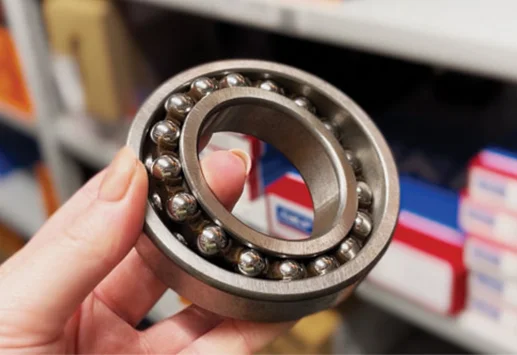5 Reasons to Use Self-Aligning Ball Bearings

Maintaining efficiency and reliability is essential in many industries. This means bearings face many challenges, the most significant being misalignment issues, which can increase wear, reduce efficiency, and lead to costly downtime. Fortunately, self-aligning ball bearings have proven to be an excellent solution in these harsh conditions, offering unique benefits in terms of load handling and misalignment correction.
Self-aligning ball bearings are designed to accommodate both static and dynamic misalignment. Unlike standard bearings, they provide more flexibility and resilience, adapting to minor shifts and deflections without compromising performance. This feature is especially beneficial when bearings are used in machinery where continuous high-speed operation is required.
In this post, we’ll explore the advantages of self-aligning ball bearings and how they can improve machinery performance.
- Automatic Misalignment Correction: certain machinery can often experience shifts and minor alignment issues due to vibrations, shock loads, and temperature fluctuations. Self-aligning ball bearings are built to compensate for misalignments between the shaft and housing. This self-correcting feature reduces the risk of premature wear, decreases maintenance requirements, and ultimately extends the bearing’s lifespan.
- Superior Load Handling: Self-aligning ball bearings can withstand radial and very light axial loads, making them well-suited for applications in industries like industrial fans, agriculture, material handling, food & beverage and pulp & paper. These bearings provide optimal load distribution, reducing stress on individual components and preventing uneven wear.
- High-Speed Performance: Unlike roller bearings that use linear contact, self-aligning ball bearings rely on point contact. This feature allows them to operate efficiently at higher speeds with reduced friction, ensuring smoother, cooler operation even under strenuous conditions. The high-speed capability is vital for machinery that relies on continuous, rapid motion to maintain productivity.
- Reduced Maintenance Downtime: Regular maintenance is crucial for any industrial setup but can be costly and time-consuming. Self-aligning ball bearings offer enhanced durability, reducing the frequency and intensity of maintenance requirements. In high-demand environments, this advantage minimises downtime, enabling uninterrupted production and saving both time and operational costs.
- Enhanced Performance in Contaminated Environments: Many harsh environments, such as those in agriculture, are subject to dust, moisture, and other contaminants that can lead to corrosion and damage to mechanical parts. Self-aligning bearings are often designed with seals or shields to prevent contaminants from entering, which prolongs their operational life even in adverse conditions. Some models are also made from corrosion-resistant materials, ensuring they can withstand exposure to harmful particles or liquids.
How to Select the Right Self-Aligning Bearing
When choosing a self-aligning bearing, it’s essential to consider factors such as load type, operational speed, and environmental conditions. Here are some tips for selecting the right bearing:
- Load Capacity: Assess the weight and type of loads your machinery handles. While self-aligning ball bearings are excellent for radial loads, if your application requires high axial load capacity, it may be beneficial to combine them with other bearing types.
- Material Selection: In environments with high moisture or chemical exposure, consider bearings made from corrosion-resistant materials.
- Sealing Options: Sealed self-aligning ball bearings can be ideal in contaminated environments, preventing dirt, dust, and moisture from entering.
Conclusion
Self-aligning ball bearings are invaluable for machinery operating in challenging environments. Their automatic misalignment correction, high-speed capability, and robust load handling make them ideal for applications in industries requiring strength and efficiency. By reducing maintenance requirements and preventing premature wear, self-aligning ball bearings help keep operations running smoothly and reduce operational costs in the long term. ACORN is committed to finding the best solution for your machinery that will keep you up and running for longer; talk to our bearing specialist today about your machine's requirements.
